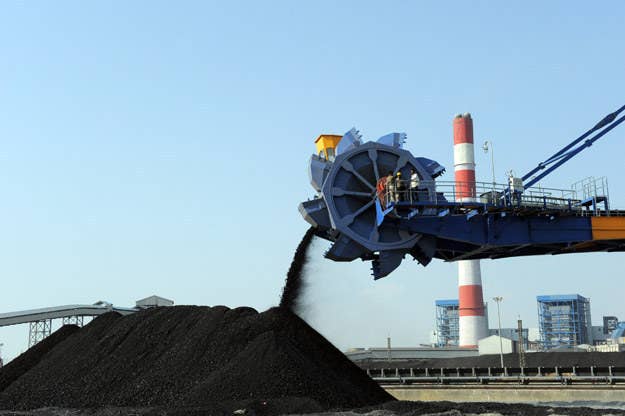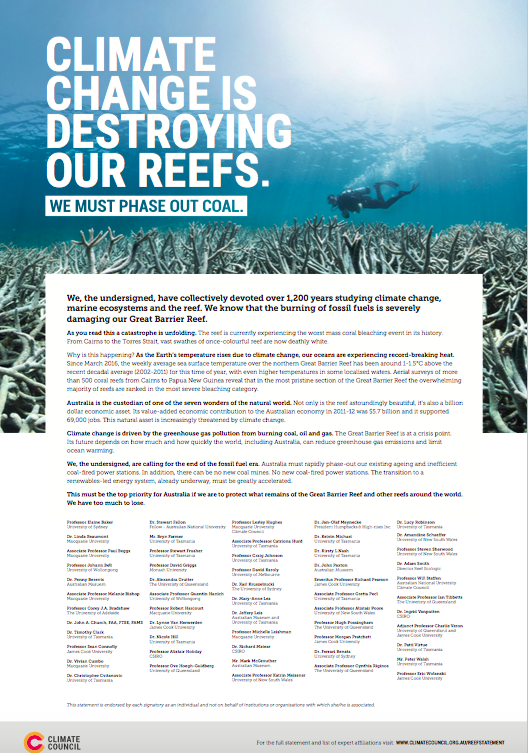Dr Charlie Veron, a marine scientist known as the "Godfather of Coral", says the Great Barrier Reef – one of the seven wonders of the natural world – is in grave danger if the Australian government doesn't act on climate change.

Veron, who has worked on the reef for 45 years, says that without immediate action, the entire reef could soon be dead.
Researchers from Australia's National Coral Bleaching Taskforce (NCBT), a federal government-funded initiative devoted to researching the reef, revealed yesterday that only 7% of the the world's largest living structure has been left unaffected by a massive coral bleaching event.
Coral bleaching occurs when abnormal water conditions, such as rising temperatures caused by climate change, expel tiny photosynthetic algae called zooxanthellae, turning the coral white and effectively killing it.
Veron says it was only a sudden easing of warm conditions in December which prevented the coral bleaching from spreading to 100% of the reef.
"Once the coral's bleached, it's dead. It's the end of the road," Veron says. "It's a matter of time before that full whammy happens."
Veron is especially critical of the federal and Queensland state governments' decision to approve the massive Adani Carmichael coal mine in Queensland's Galilee basin, 500km from the reef.
At its peak, the mine is projected to produce 60 million tonnes of coal each year from six open-cut pits and five underground mines. The project has the backing of both the federal and Queensland state governments, which say it will create thousands of jobs and inject $16 billion into the economy.
Over its life, the mine is expected to pump billions of tonnes of carbon dioxide into the atmosphere.

"Both governments have approved the the Adani mine without thinking of the consequences," Veron says. "It's the last thing Australia, of all countries, should be doing. I can't think of anything more harmful to do to the Great Barrier Reef than that."
It's a sentiment echoed by Professor Terry Hughes, convener of the NCBT, who says the approval of the mine shows the government isn't serious about stopping climate change and saving the reef.
The mine, which faces serious economic hurdles that may keep it from ever being constructed, has been granted a 60-year lease by federal environment minister Greg Hunt.
"I think an appropriate reaction from Hunt would be to rescind the 60-year permit," Hughes says. "That would be real action for the Great Barrier Reef."
A spokesman for Hunt directed questions about the mine to the Queensland government, but said he is committed to saving the reef.
Queensland's environment minister, Steven Miles, passed the buck back to the federal government:
"What the reef needs is a set of policies that will cap and reduce emissions in real terms year on year. The state government will play our part within the scope of our powers, but meeting our Paris [Climate Conference] targets is primarily the responsibility of the national government.
"What we don't have right now, and what we are demanding the Turnbull government deliver, is a national plan to meet those targets."
Scientists from the Climate Council took the unusual step on Thursday of placing a full page ad in Queensland's Courier Mail. It said climate change is destroying the reef and immediate action is needed to prevent further damage.

The open letter contained the signatures of 56 experts with more than 1,200 years experience in studying climate change and called for an end to investment in fossil fuels in Australia.
"As you read this, a catastrophe is unfolding," the letter reads, before going on to explain the extent of the coral bleaching event:
"Why is this happening? As the Earth's temperature rises due to climate change, our oceans are experiencing record-breaking heat."
Climate Councillor Professor Lesley Hughes said there is no doubt that the massive coral bleaching event on the reef is the result of climate change.
"This is not a surprise because we have known for decades that the burning of fossil fuels is driving climate change, and that delicate ecosystems like the reef will be destroyed as a result," she said.
"We are now seeing first hand the damage that climate change causes, and we have a duty of care to speak out."
